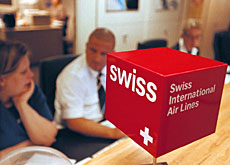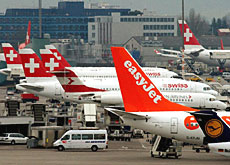Bumpy ride ahead as Swiss clips its wings

The announcement of radical cost-cutting measures at Swiss has boosted shares in the national carrier, despite misgivings among some financial analysts.
In an interview with swissinfo, aviation consultant Dieter Schneiderbauer says the latest measures show that management is acting to cut costs significantly.
Swiss said on Tuesday that it would cut between 800 and 1,000 jobs over the next 18 months and reduce its fleet by 13 aircraft.
The carrier said the measures were intended to reduce net annual costs by around SFr300 million ($252 million) as of 2007.
Munich-based Schneiderbauer, of Mercer Management Consulting, says Swiss may now be on course for a profit in 2006.
But he believes management still has to answer some fundamental questions.
swissinfo: The announcement follows speculation about plans for a separate regional airline or a new low-cost strategy. Is it not something of an anti-climax?
D.S.: Indeed. Some people expected that they would establish a new subsidiary for regional and continental European operations, which did not happen. Obviously, management believes it can sort out its problems within one legal entity. The negotiations over new labour agreements will demonstrate whether this is the case.
So far, management has concentrated on structural issues, but it will need to review labour agreements if it is to benefit fully from this restructuring.
swissinfo: So what does this announcement actually mean?
D.S.: It is clear that they are now ready to take decisive action to restructure the European network and lower costs significantly. That implies some measures that will not be welcomed, either by employees or some customers in Geneva and Basel. But there is no alternative to bringing down unit costs and becoming more competitive vis-à-vis low-cost competitors in continental Europe.
swissinfo: In the past, Swiss has been accused of hopping from one strategy to the next. Whether or not people like the current approach, is the direction now clear?
D.S.: Company CEO Christoph Franz and the new management have set a clear course and are following it. Swiss has neither the time nor the resources to afford another strategic shift. They need to become profitable and they are fixing one problem at a time. They are now trimming the European network and putting profitable routes and airport operations first, which is hopefully the pathway to success.
swissinfo: Franz now hopes to bring the airline into profit by 2006. Do you think this is realistic?
D.S.: The restructuring programme sets the right direction for making Swiss a sustainably profitable carrier. But the focus is still on the regional network and the short-haul network in Europe. Swiss also needs to sort out its strategy in the long-haul market, and that means affiliation to one of the leading global alliances.
swissinfo: The alliance issue seems to have been almost forgotten since talks with British Airways fell apart. What is happening now?
D.S.: Franz has made it clear that he wants to fix the critical issues first, before turning to the issue of strategic affiliation. This is the right approach for the first six to 12 months, but I would assume that in the second half of 2005, Swiss management would start [again] to consider a closer alliance.
swissinfo: Is there not also a risk of Swiss cutting its supply of passengers to its longer-haul flights, and thus undermining its own strategy?
D.S.: There is a threat if the European network becomes too small and does not generate enough traffic. This will need to be reviewed when more details are known about the plan. However, my understanding is that they will not only keep the Zurich network, but also try to strengthen it through more codeshare flights.
swissinfo: Swiss had cut several thousand jobs and a third of its fleet even before the latest measures. How much further must they go to be the right size for their market?
D.S.: What the final size and shape of Swiss might be is hard to say today. If they do succeed in turning around the regional and continental European network, they will probably be near to the staffing and fleet sizes that are needed to be cost-competitive. But the aviation market in Europe and worldwide is so volatile these days that you can never tell whether this will be the last cut.
swissinfo: Is the market situation as a whole finally looking better?
D.S.: Last year was the first time since 2001 that global aviation markets picked up. Swiss benefited from this, as did all European carriers. But the airlines that are growing fastest are those that have a very focused strategy. They are either leading low-cost carriers or they are players focusing on a global network or on regional networks and trunk routes.
swissinfo-interview: Chris Lewis
Swiss plans to cut its regional fleet by at least 13 planes and axe up to 1,000 jobs, in response to fierce competition.
CEO Christoph Franz said the measures should lower annual costs by SFr300 million by 2007.
Shares rose some 14 per cent on Tuesday, after trading resumed, but fell back at the end of the day to SFr9.80 (+4.26 per cent).
Aviation consultant Dieter Schneiderbauer says Swiss is now following a clear strategy to make its European operations competitive.
However, he says cost-cutting will not be enough in the long term – the airline must also resume its search for a global partner.
He adds that market conditions are looking up, but remain highly volatile.

In compliance with the JTI standards
More: SWI swissinfo.ch certified by the Journalism Trust Initiative


You can find an overview of ongoing debates with our journalists here . Please join us!
If you want to start a conversation about a topic raised in this article or want to report factual errors, email us at english@swissinfo.ch.